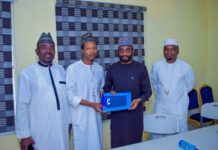
The Pantami I Know: A Testimony to His Humility, Wisdom, and Leadership
By Abubakar Umar
I vividly remember my first encounter with Shaykh Professor Ali Isa Pantami back in 2001. It was at the Ummah Mosque,
Abubakar Tafawa Balewa University (ATBU) Bauchi, shortly after the Zuhr prayer. He had gathered all the new students—Direct Entry, 100 Level, and Remedial students—for a welcome address. In his usual endearing and impactful style, he urged us to fear Allah, dedicate ample time to our studies, and surround ourselves with individuals who would enhance our lives, both in terms of faith and academics. Those golden few minutes have left a lasting impression, serving as a guiding principle throughout my time on campus.
Barely two weeks later, I encountered him again near the popular L.E. Lecture rooms, walking from the car park to the department. I was with a dear friend who happened to be wearing jeans that extended below his ankles. In his characteristic gentle manner, Prof. Pantami greeted us warmly, shook our hands, and kindly corrected my friend’s attire.
Following that, he inquired about our studies. We responded with an “Alhamdulillah,” and he imparted more timeless wisdom: “Make every effort to understand what you’re being taught. For those aspects that require memorization, commit them to memory; for those that demand comprehension, ensure you grasp them fully. But remember, there is no time to waste—time runs faster here.”
Those words became our mantra, and by Allah’s grace, we graduated among the top of our classes.
Simplicity and Listening Ears
One of Prof. Pantami’s most remarkable qualities, which many may not know, is his simplicity and willingness to listen. Throughout our undergraduate years to the present day, we have had the unique freedom to offer corrections. On various occasions, we approached him with concerns about certain matters we felt were not handled correctly. He never frowned, despite the daunting nature of the conversation for us. Instead, he expressed gratitude, prayed for us, and provided detailed explanations. Often, it turned out we had misunderstood the situation. At other times, he acknowledged a mistake or oversight and promised to rectify it—which he consistently did.
I have, on a few occasions, reached out to Shaykh while he was serving as Minister, beginning with the phrase: “Malam, ku ji tsoron Allah” (meaning, “You should fear Allah”) before expressing my frustrations. To my astonishment, instead of replying via WhatsApp, he would often call me, despite his packed schedule. After exchanging pleasantries, he would smile and say, “Ka cika zafi, Malam Abubakar” (meaning, “You’re too emotional, Malam Abubakar”), before calmly explaining the situation in detail. Despite being his student, younger, and far less knowledgeable, I always felt respected and honored by his responses.
A Leader Who Values Ideas
Shaykh Pantami’s openness to new ideas is another standout trait. Those who work closely with him will tell you that when you present an issue, he first gives you the floor to suggest solutions. His favorite line is, “How do you think we should go about this?” If your idea is feasible, he empowers you to coordinate it with others and ensures that you have his full support to bring it to fruition.
Prof. Pantami’s generosity is unmatched, yet he insists on maintaining anonymity. Time and again, he has helped individuals through me, emphasizing the importance of not disclosing his involvement.
A Lifelong Impact on Thousands
As someone who was actively involved in the MSSN ATBU from my first year—serving as Assistant Chairman, then Chairman of the Da’wah Committee, Assistant Secretary General, and later General Secretary—I witnessed firsthand the transformative impact of Prof. Pantami. Through his tireless efforts, he has positively influenced thousands of young people—not just on our campus but also in nearby polytechnics and the Yelwa community.
His life is a testament to humility, service to faith, and dedication to humanity. Truly, Shaykh Pantami is an unassuming figure whose legacy will continue to inspire generations.
Dr. Abubakar Umar (@Realoilsheikh)















